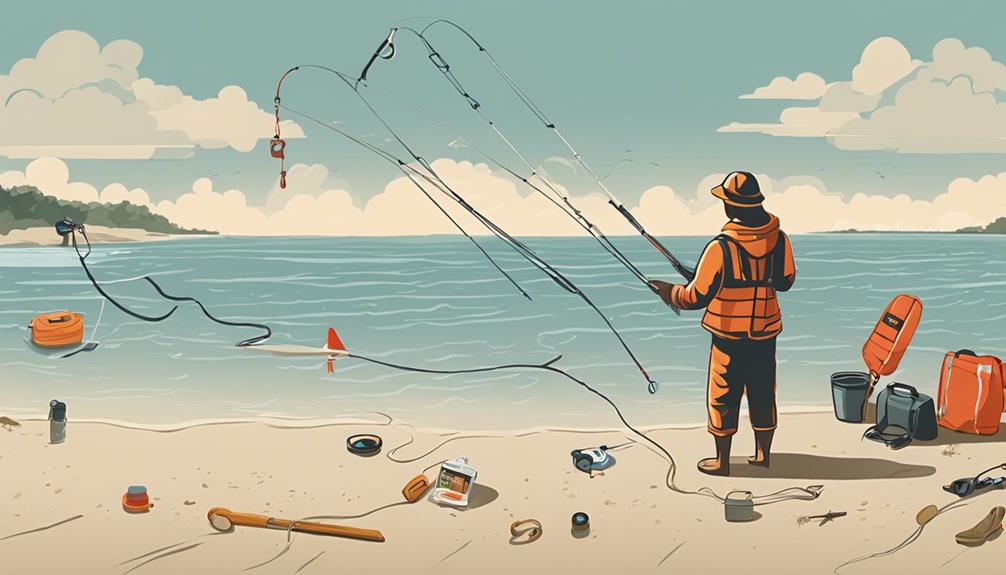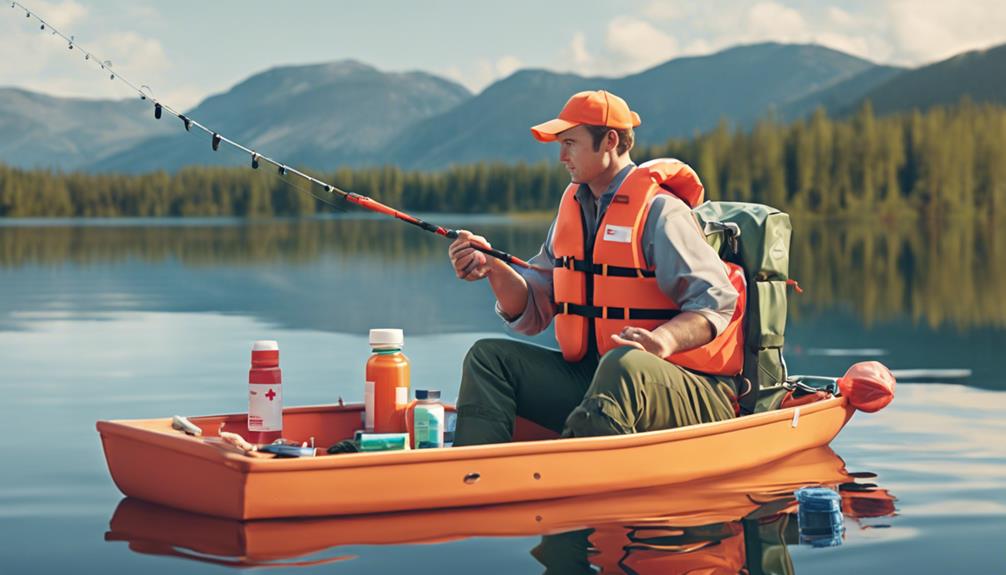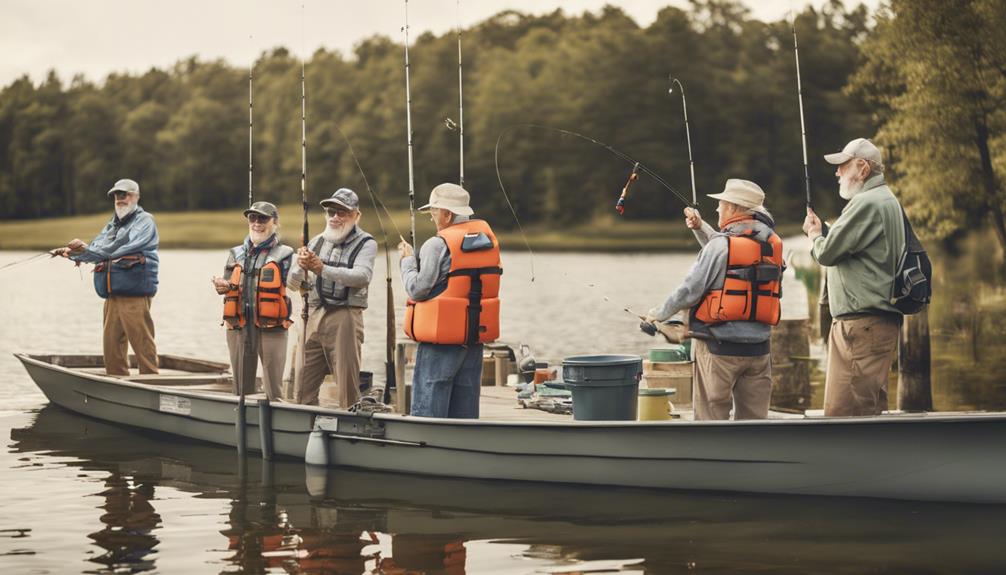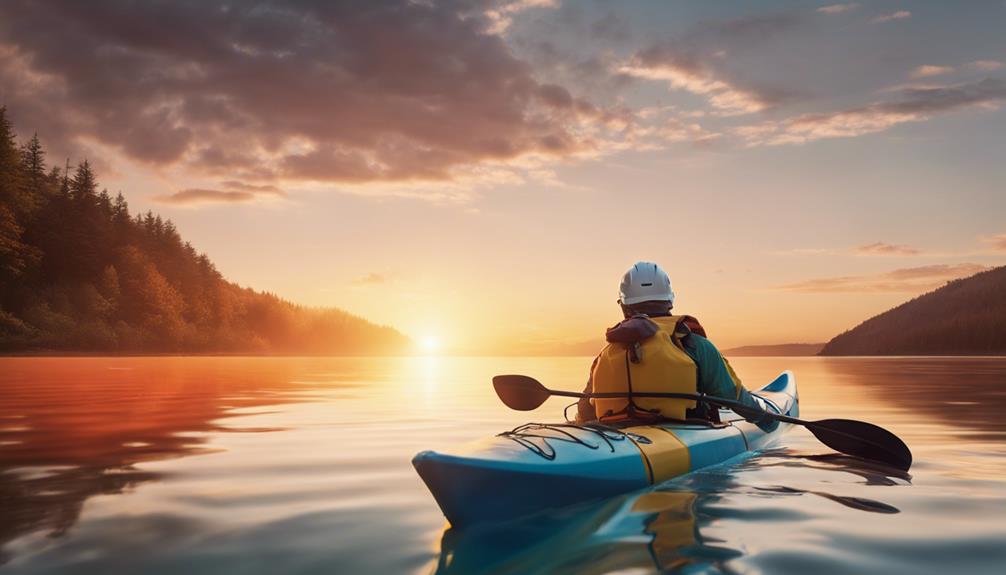To begin your beach fishing adventure, remember the crucial component of caution when casting your line into the coastal waters. Ensuring safety during this serene activity requires more than just a sturdy rod and bait. Equip yourself with essential knowledge and gear to navigate potential hazards effectively.
From unpredictable weather patterns to powerful tides, the beach poses unique challenges for anglers. Stay tuned to discover the top safety tips that will help you enjoy a successful and secure fishing experience by the shore.
Importance of Proper Equipment
To ensure your safety and success while beach fishing, having the right gear is essential. Choosing the right gear for beach fishing can make a significant difference in your experience. When it comes to selecting your equipment, there are a few key things to keep in mind. Firstly, consider the type of fish you're targeting and the specific conditions of the beach you'll be fishing at. Different fish require different bait and tackle, so it's important to have the appropriate gear for your target species.
Proper attire is also crucial for a successful beach fishing excursion. Wearing the right clothing can protect you from the sun, wind, and potential rain. Opt for lightweight, breathable clothing that will keep you cool and comfortable throughout the day. A wide-brimmed hat, polarized sunglasses, and sunscreen are essential items to shield yourself from the sun's harmful rays.
Additionally, investing in a good pair of water-resistant shoes with excellent grip can prevent slips on wet rocks or sandy surfaces. Remember that the beach environment can be unpredictable, so being prepared with the right gear and attire is key to ensuring a safe and enjoyable fishing experience. By selecting the appropriate gear and dressing appropriately, you set yourself up for a successful day of beach fishing.
Check Weather Conditions
Before heading out for a day of beach fishing, always check the weather conditions to ensure your safety and preparedness. Here are some essential tips to help you make the most of your fishing trip:
- Sunscreen Application: Protect your skin from harmful UV rays by applying sunscreen generously before heading out. Reapply regularly, especially if you plan to spend an extended period fishing under the sun.
- Check Wind Speed: Pay attention to the wind speed as it can affect your casting distance and the behavior of the fish. Strong winds can make casting difficult and may even pose safety risks, so adjust your fishing technique accordingly.
- Monitor Weather Changes: Weather conditions can change rapidly, especially near the coast. Keep an eye on the sky for any signs of incoming storms or shifting winds. It's crucial to be prepared and have a plan in case the weather takes a turn for the worse.
- Dress Appropriately: Dress in layers to adapt to changing weather conditions throughout the day. Bring a waterproof jacket in case of rain and wear a hat to protect yourself from the sun. Comfortable, weather-appropriate clothing can make your fishing experience more enjoyable and safe.
Be Mindful of Tides
Being mindful of tides is crucial for successful beach fishing trips, as they greatly impact the fish's behavior and your fishing experience. Understanding currents is key when fishing from the shore. Fish tend to follow the movement of the water, so knowing how the currents operate can help you determine where the fish are likely to be. When the tide is coming in, fish are often closer to the shore, feeding on small crustaceans and other organisms brought in by the waves. On the other hand, when the tide is going out, fish may move to deeper waters as they follow the receding water.
Watching waves is another essential aspect of being mindful of tides. Waves can affect the distribution of fish along the shoreline. During high tide, waves may be crashing against the rocks or cliffs, potentially causing dangerous conditions for fishing. Conversely, during low tide, the water may recede significantly, making it harder to reach certain fishing spots. By observing the waves, you can better plan your fishing location and ensure a safer and more productive fishing experience.
Stay Hydrated and Protected
Ensuring proper hydration and protection is essential for a safe and enjoyable fishing experience. Spending long hours under the sun can easily lead to dehydration and sunburn, so taking care of your body is crucial. Here are some key tips to help you stay hydrated and protected during your beach fishing trip:
- Stay Hydrated: Remember to drink plenty of water throughout your trip. The combination of sun and salty sea breeze can quickly dehydrate you, so taking regular water breaks is important to keep your body functioning well.
- Apply Sunscreen: Before heading out for a day of fishing, generously apply sunscreen with a high SPF rating. Reapply every few hours, especially after swimming in the ocean. This will help protect your skin from the harmful effects of UV rays.
- Wear Protective Clothing: Choose lightweight, breathable clothing that covers your skin. A wide-brimmed hat, polarized sunglasses, and a long-sleeved shirt can offer additional protection from the sun's rays.
- Seek Shade: Whenever possible, take breaks in the shade to give your body a reprieve from direct sunlight. This can help prevent overheating and sunstroke, ensuring you can fish comfortably all day long.
Know Your Surroundings
To ensure a safe beach fishing experience, understanding and being aware of your surroundings is crucial. Before casting your line, take a moment to familiarize yourself with potential beach hazards and wildlife encounters that could pose risks to your safety.
Beach hazards come in various forms, such as strong currents, rip tides, and sudden weather changes. It's essential to keep an eye out for warning signs, flags, or advisories that indicate dangerous conditions. Avoid fishing near rocky areas or steep cliffs where unexpected waves can sweep you off your feet. Always check the tide schedule before heading out to prevent being stranded due to rising water levels.
Wildlife encounters are common when beach fishing, so knowing how to react is key. Keep a safe distance from marine animals like jellyfish, stingrays, or sharks. If you hook a fish and a predator approaches, consider cutting your line to prevent a dangerous confrontation. Additionally, be cautious of nesting birds or sea turtles, as disturbing them can have legal consequences and disrupt local ecosystems.
Buddy System for Safety
For added safety while beach fishing, consider partnering up with a buddy. Having someone with you not only makes the experience more enjoyable but also enhances safety by providing an extra pair of eyes and hands in case of emergencies.
Here are some tips for implementing the buddy system effectively:
- Emergency Signals: Establish clear emergency signals with your buddy before starting your fishing session. These signals should be simple and easy to understand, such as a series of whistles or hand signals, to indicate that help is needed.
- Communication Plan: Develop a communication plan with your buddy to ensure you can easily reach each other in case you get separated along the beach. This plan should include designated meeting points and a way to contact each other if one person moves to a different spot.
- Regular Check-Ins: Make it a habit to check in with your buddy regularly, especially if you're fishing in a remote or less crowded area. Knowing each other's whereabouts can help prevent accidents and ensure quick assistance if needed.
- Mutual Support: Remember that the buddy system works both ways. Be prepared to assist your buddy in case of emergencies and always have each other's back during your beach fishing adventure.
First Aid Preparedness
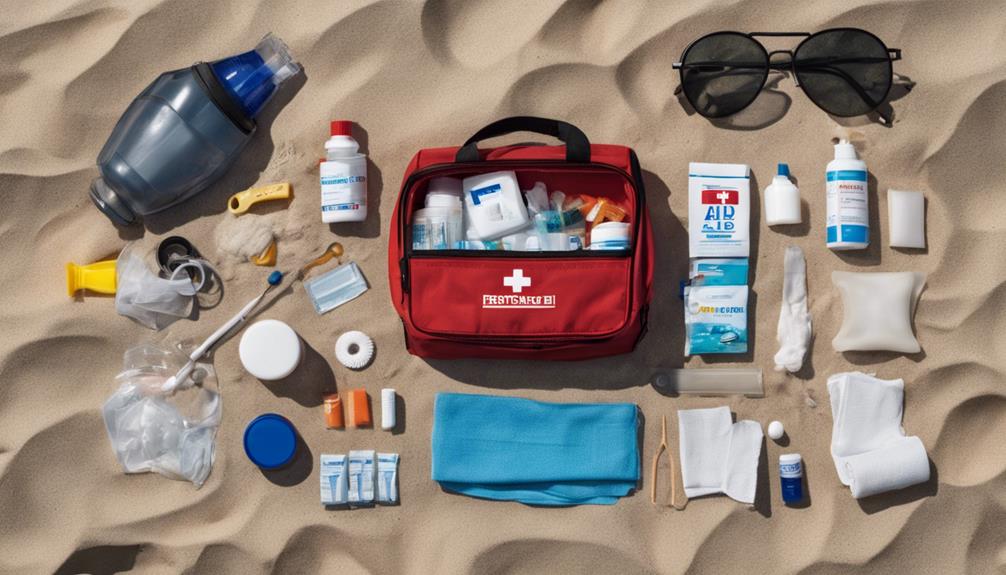
Consider packing a compact first aid kit with essential supplies such as bandages and antiseptic wipes for immediate response to any injuries while beach fishing with your buddy. Basic first aid knowledge is crucial for handling common fishing-related injuries like cuts, hooks stuck in skin, or minor burns from the sun. With a well-equipped first aid kit, you can attend to these injuries promptly, preventing complications and ensuring a safe fishing experience.
In case of an emergency, knowing how to respond is key. Familiarize yourself with basic first aid procedures such as how to stop bleeding, treat burns, or perform CPR if needed. Being prepared can make a significant difference in the outcome of an emergency situation. Remember to regularly check and replenish your first aid kit, ensuring that all supplies are up to date and in good condition.
When beach fishing, it's essential to be proactive in your emergency response planning. Discuss with your buddy the steps to take in case of an injury or emergency. Assign roles and responsibilities so that everyone knows what to do. Practice scenarios together to ensure a smooth execution in a real-life situation. By being prepared and equipped with basic first aid knowledge, you can enjoy your beach fishing adventures with confidence and peace of mind.
Emergency Contacts Ready
Ensure you have your emergency contacts readily available before embarking on your beach fishing excursion. Being prepared for emergencies is crucial for your safety while enjoying beach fishing. Here are some tips to ensure your emergency preparedness and communication protocols are in place:
- Emergency Contact List: Compile a list of emergency contacts including local emergency services, coastguard, family members, and friends. Store this list in your phone and ensure it's easily accessible in case of an emergency.
- Waterproof Protection: Use a waterproof case or a ziplock bag to safeguard your phone or a physical emergency contact list. This ensures that your emergency contacts remain intact even if you come in contact with water.
- Communication Devices: Carry a fully charged phone or a two-way radio with you. Test these devices before heading out to ensure they're working correctly and can be used to reach out for help if needed.
- Designated Emergency Caller: Establish a communication protocol among your fishing group. Designate one person as the emergency caller who'll contact emergency services if needed. This ensures a swift and coordinated response in case of an emergency situation.
Frequently Asked Questions
What Are Some Common Beach Fishing Hazards to Be Aware Of?
When beach fishing, be cautious of common hazards like strong currents, slippery rocks, and high tides. To stay safe, always wear appropriate footwear, bring a buddy along, and check the weather forecast before heading out.
Safety precautions such as keeping an eye on changing tidal conditions, avoiding isolated areas, and having a first aid kit handy can help prevent accidents.
Stay alert and prepared to make your beach fishing experience enjoyable and safe.
How Can You Prevent Injuries While Beach Fishing?
To prevent injuries while beach fishing, make sure to stay hydrated and protect yourself from the sun.
Keep your equipment well-maintained and carry a first aid kit just in case.
These steps can help you enjoy your fishing trip safely.
Are There Any Specific Regulations or Rules to Follow When Beach Fishing?
When beach fishing, it's essential to know the rules. Fishing permits are often required, and there may be restrictions on certain areas. Always follow beach etiquette and respect conservation efforts to protect the environment and marine life.
What Should You Do in Case of a Medical Emergency While Beach Fishing?
If a medical emergency occurs while beach fishing, you must remain calm and assess the situation. Start by applying first aid if necessary and calling for emergency response immediately. Ensure the injured person is safe and comfortable while waiting for help to arrive.
Remember to provide clear and accurate information to the emergency responders to assist them in providing the necessary care. Your quick actions can make a significant difference in the outcome of the situation.
How Can You Properly Handle and Release Caught Fish to Ensure Their Survival?
When fishing at the beach, proper handling of caught fish is crucial for their survival. Make sure to handle the fish gently, avoid injuring them, and release them back into the water carefully.
Learn beach fishing techniques to improve your skills in catching and releasing fish. By following these steps, you can help ensure the survival of the fish population and maintain a healthy ecosystem.
Conclusion
Remember, beach fishing can be a fun and rewarding experience, but safety should always come first. By following these top safety tips, you can ensure a successful and enjoyable day out on the water.
Always be prepared, stay aware of your surroundings, and have a plan in case of emergencies. With the right equipment, knowledge, and precautions, you can have a great time fishing while staying safe and protected.
